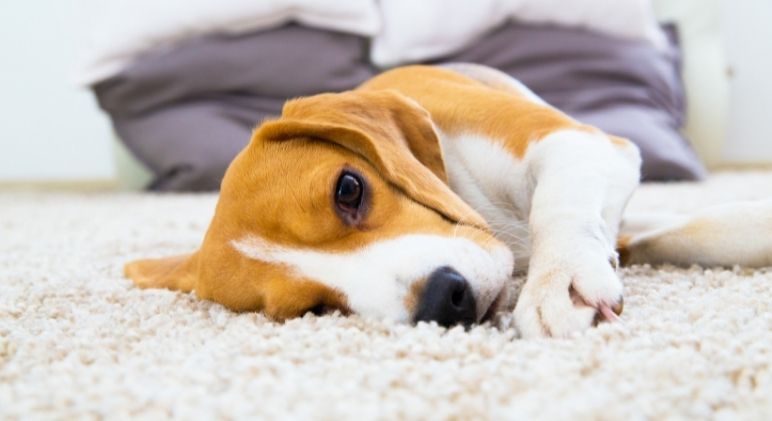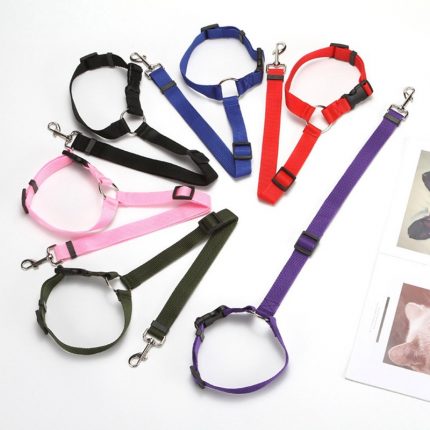Why Do Dogs Rub Their Face on the Floor?
Dogs are fascinating creatures that exhibit a wide range of behaviors. One peculiar behavior that many dog owners have witnessed is their furry friend rubbing their face on the floor. This intriguing action often raises questions and curiosity about its underlying reasons. While it may seem odd to us humans, there are several theories and explanations as to why dogs engage in this behavior.
One possible reason for dogs rubbing their face on the floor is to alleviate an itch or irritation. Just like humans, dogs can experience discomfort caused by allergies, dry skin, or even insect bites. By rubbing their face on the floor, they may be attempting to relieve the itchiness or irritation they are feeling. This behavior could be their way of finding temporary relief, similar to how we might scratch an itch.
Another theory suggests that dogs rub their faces on the floor as a means of marking their territory. Dogs have scent glands located on their faces, particularly around their cheeks and chin. When they rub their face on the floor, they may be leaving behind their scent as a way of marking their territory and communicating with other dogs. This behavior is similar to how dogs mark their territory by urinating on objects or rubbing their bodies against surfaces.
Additionally, rubbing their face on the floor could be a form of self-soothing for dogs. Just like humans, dogs can experience stress, anxiety, or even frustration. Engaging in repetitive behaviors, such as rubbing their face on the floor, can provide them with a sense of comfort and help them cope with these emotions. It may serve as a way for dogs to self-regulate and find solace in a familiar action.

It is important to note that while face rubbing can be a normal behavior for dogs, excessive or compulsive rubbing may indicate an underlying issue that requires attention. If a dog excessively rubs their face to the point of causing injury or if the behavior is accompanied by other concerning symptoms, it is recommended to consult with a veterinarian to rule out any medical conditions or behavioral problems.
Understanding why dogs rub their face on the floor can help us better comprehend their needs and behaviors. Whether it’s to relieve an itch, mark territory, or find comfort, this behavior is just another fascinating aspect of canine behavior. As responsible dog owners, it is essential to observe and interpret our furry companions’ actions with care and provide them with the necessary support and attention they require.
The Curious Behavior: Why Do Dogs Rub Their Face on the Floor?
Dogs are known for their unique behaviors and habits, and one behavior that often leaves pet owners puzzled is their tendency to rub their face on the floor. This seemingly strange act can have several explanations, ranging from physical discomfort to instinctual behaviors rooted in their ancestry.
Relief from Itching and Irritation
One plausible reason for dogs rubbing their face on the floor is to alleviate itching and irritation. Dogs, like humans, can experience allergies, dry skin, or insect bites that cause discomfort. By rubbing their face on the floor, they may be attempting to relieve the itchiness or irritation they are feeling. The rough texture of the floor can provide temporary relief, similar to how we might scratch an itch to find comfort.
Territorial Marking
Another theory suggests that dogs rub their faces on the floor as a way to mark their territory. Dogs have scent glands located on their faces, particularly around their cheeks and chin. When they rub their face on the floor, they leave behind their scent, effectively marking their territory and communicating with other dogs. This behavior is similar to how dogs mark their territory by urinating on objects or rubbing their bodies against surfaces.
Self-Soothing and Comfort
Rubbing their face on the floor could also serve as a form of self-soothing for dogs. Just like humans, dogs can experience stress, anxiety, or frustration. Engaging in repetitive behaviors, such as face rubbing, can provide them with a sense of comfort and help them cope with these emotions. It may serve as a way for dogs to self-regulate and find solace in a familiar action.
Medical Conditions and Behavioral Issues
While face rubbing can be a normal behavior for dogs, excessive or compulsive rubbing may indicate an underlying issue that requires attention. If a dog excessively rubs their face to the point of causing injury or if the behavior is accompanied by other concerning symptoms, it is recommended to consult with a veterinarian. Certain medical conditions, such as skin infections, allergies, or dental problems, can cause dogs to engage in excessive face rubbing. Additionally, behavioral issues or anxiety disorders may contribute to this behavior, requiring professional intervention and guidance.
Conclusions
In conclusion, understanding the reasons behind why dogs rub their face on the floor can provide valuable insights into their behavior and well-being. For a deeper dive into this topic, visit geepets.com, where you’ll find a comprehensive exploration of canine behaviors and what they mean for your furry friend’s health.
, for further reading and resources on dog behavior, The American Kennel Club (AKC) offers a wealth of information on a variety of dog behaviors, including why dogs might exhibit this peculiar face-rubbing habit. Both of these resources can help you better understand your pet’s actions and ensure they’re happy and healthy.

Practical Recommendations for Addressing Dogs Rubbing Their Face on the Floor
1. Regular Grooming and Skin Care
Maintaining good hygiene and skin care practices can help alleviate itching and irritation in dogs. Regularly brushing your dog’s coat can remove loose hair and prevent matting, which can contribute to discomfort. Additionally, using appropriate shampoos and conditioners, specifically formulated for dogs, can help keep their skin healthy and moisturized, reducing the likelihood of itching and irritation.
2. Consult with a Veterinarian
If you notice your dog engaging in excessive face rubbing, a behavior often summarized by the question, “Why do dogs rub their face on the floor?” it’s important to closely observe for any accompanying symptoms such as redness, swelling, or hair loss. This behavior, while sometimes a simple act of trying to relieve an itch, can often lead people to wonder, “Why do dogs rub their face on the floor?” especially when it seems excessive or obsessive.
In such cases, it’s crucial to consult with a veterinarian. They can conduct a thorough examination to rule out any underlying medical conditions that might be causing your dog to persistently ask, “Why do dogs rub their face on the floor?” through their actions. Possible reasons behind the question, “Why do dogs rub their face on the floor?” include allergies, skin infections, or dental issues. The veterinarian can provide appropriate treatment options or recommend further diagnostic tests if necessary, addressing the root cause of why your dog feels compelled to rub their face on the floor. Understanding and treating the underlying issue can help alleviate your dog’s discomfort and reduce the frequency of this behavior.
3. Address Allergies and Sensitivities
Allergies are a common cause of itching and discomfort in dogs. Identifying and addressing potential allergens can help alleviate their symptoms. Your veterinarian may recommend allergy testing or a trial of hypoallergenic diets to identify and eliminate potential triggers. In some cases, antihistamines or other medications may be prescribed to manage allergic reactions and reduce itching.
4. Provide Environmental Enrichment
Dogs may engage in face rubbing as a means of self-soothing or coping with stress or anxiety, a behavior that often leads pet owners to wonder, “Why do dogs rub their face on the floor?” Understanding the reasons behind this action, such as stress or seeking comfort, is crucial. Providing them with environmental enrichment can help alleviate these emotions and reduce the instances where one might ask, “Why do dogs rub their face on the floor?”
Interactive toys, puzzle feeders, and regular exercise can keep dogs mentally stimulated and physically active, reducing their stress levels and minimizing the need for self-soothing behaviors that prompt the question, “Why do dogs rub their face on the floor?”
Incorporating these strategies can significantly decrease the frequency of behaviors that might cause concern or curiosity, leading to the question, “Why do dogs rub their face on the floor?” By understanding the root causes and addressing them with appropriate environmental enrichment, the need to ask, “Why do dogs rub their face on the floor?” becomes less prevalent, ensuring a happier and less stressed canine companion.

5. Seek Professional Behavioral Intervention
If face rubbing persists as a compulsive behavior or is accompanied by other behavioral issues, it may be beneficial to seek professional behavioral intervention. When wondering, “Why Do Dogs Rub Their Face on the Floor,” it’s important to understand that this behavior can sometimes signal underlying issues that require attention. A certified dog behaviorist or trainer can assess the underlying causes, including those related to the question of “Why Do Dogs Rub Their Face on the Floor,” and develop a tailored behavior modification plan to address the issue.
They can provide guidance on positive reinforcement techniques and strategies to redirect the dog’s behavior away from compulsively answering the question of “Why Do Dogs Rub Their Face on the Floor” with the action itself. Addressing the root of “Why Do Dogs Rub Their Face on the Floor” can lead to more effective and lasting solutions, ensuring your dog’s wellbeing and helping mitigate this behavior.
6. Ensure a Safe and Comfortable Environment
Creating a safe and comfortable environment for your dog is essential in promoting their overall well-being, especially when addressing behaviors such as why do dogs rub their face on the floor. Ensure that their living space is free from potential irritants, such as harsh cleaning chemicals or allergens, which could be a reason behind the question, why do dogs rub their face on the floor. Provide them with a comfortable bed or resting area, and consider using calming aids like pheromone diffusers or soothing music to help reduce anxiety and stress, which might also address concerns related to why do dogs rub their face on the floor.
Our featured products:
Incorporating strategies to make your dog feel secure and at ease is crucial, as it could significantly decrease the occurrences of behaviors like why do dogs rub their face on the floor. Understanding the root cause, such as itches or discomfort that leads to the action of why do dogs rub their face on the floor, can help in tailoring their environment to prevent such issues. A well-thought-out environment, mindful of reducing stressors that contribute to why do dogs rub their face on the floor, not only supports their physical health but their emotional well-being too.
7. Regular Veterinary Check-ups
Regular veterinary check-ups are crucial in maintaining your dog’s health and identifying any potential issues early on. Routine examinations can help detect and address any underlying medical conditions that may contribute to face rubbing. Your veterinarian can provide guidance on preventive care, vaccinations, and overall wellness strategies to keep your dog in optimal health.
By following these practical recommendations, you can effectively address dogs rubbing their face on the floor. Remember, each dog is unique, and it may take time and patience to determine the underlying cause and find the most appropriate solution. Always consult with a veterinarian or professional behaviorist for personalized advice and guidance in managing your dog’s behavior and well-being.















